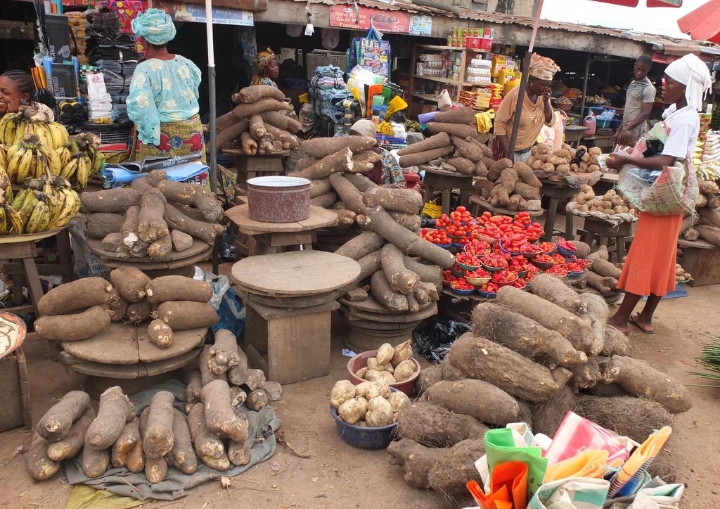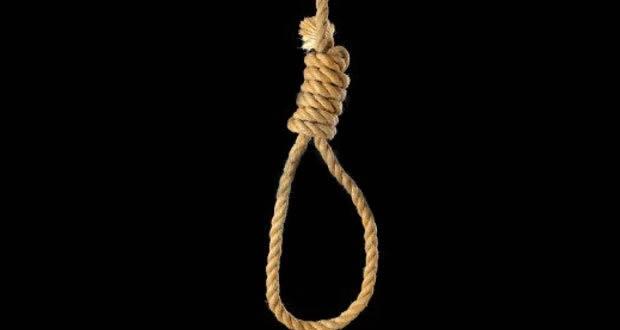Headline
Nigerian Workers Lament High Cost Of Food Items, Others
Published
3 years agoon
By
Editor
The standard of living of an average Nigerian under President Muhammadu Buhari government is steadily declining every day as prices of food continue to skyrocket daily.
Without any doubt, the current increase in prices of goods and services is tied to low farming activities, low productivity as a result of the worsening insecurity, especially in the Northern region. Many farmers flee their farms out of fear for their lives as bandits, Boko Haram, and herdsmen attack communities and kidnap families.
The current realities are forcing families into hunger, as an average Nigerian who could afford to feed three times in a day are now struggling to feed twice or less, because of the economic situation in the country.
On a monthly basis, prices of food items appear to be increasing in major cities in Nigeria. For example, the prices of flour products such as ‘bread’, grains such as ‘rice, beans, garri’, and regular beverages have experienced unimaginable hike in price within the last one month if compared with previous months within the year.
DAILY POST findings reveal that, “the price of the regular ready to eat can fish ‘Sardine’ sold at N300 now goes for N600 at the market and sell at N700 in supermarkets across the country. A bag of beans sold at N30,000 early last month ‘September’ now costs between N50,000 and N100,000. Also, sachets of beverages (e.g, milk, milo) sold at N700 now sells at N1200, cooking gas 5kg sold at N2000 now sells at N3000”. Bread that used to sell for between N350 to N400 now sells for N700. Almost all the prices of consumables have doubled within the last 1 month.
Millions of working-class Nigerians can no longer live a decent life on their income not to talk of those earning lower than the minimum wage. The question that brothers most Nigerians is, “how does a Nigerian who earns a minimum wage of N30,000 survive with the current hike in the price of food? How do families feed?” Sadly, these questions remain unanswered.
The country’s national minimum wage is N30,000 per month, mainly applicable to civil servants as some private sectors pay as low as N15,000 to workers. Also, many state governments are yet to implement the new minimum wage.
DAILY POST interacted with some Nigerians who expressed their sadness over the situation, calling on the government to act immediately.
A worker simply identified as Gloria said it’s been hard for her to feed as a spinster since the change in price.
She said, “I used to eat three times a day with breakfast but now I just manage to feed twice. During Goodluck time, I used to eat three times but now I eat once, my salary increase doesn’t even matter because I could afford more things years ago than I can now, but I spend way higher.”
Mr Dapo, a civil servant, lamented that he has two kids and is finding it hard to cater to them. He said, “I go to work every day and I cannot boast of my salary taking care of my family anymore. The lunch pack for my kids has reduced because even biscuits have increased. The other day, I went to buy gas for N10kg, it has increased too. My wife keeps complaining that the money she uses to feed the family for a month can barely sustain us for two weeks. What does Buhari want us to do? Is this the change he promised us? I don’t think we have anything like average Nigerians, it’s either you’re poor or rich under this Buhari government.”
One Mr Akin who works at a private company in Wuse 2 lamented that these days, he misses lunch break at work twice in a week because of the increase in prices of stuff in order not to be stranded before the end of the month. He said, “I wouldn’t lie to you madam, things are becoming worse oh! Imagine lunch I buy every day at N500 is now N700 and its even in smaller quantities. The woman in the canteen does not even sell N100 plantain; it starts from N200. How does Buhari want responsible workers to live a good life? As a young man, now I can’t even think of having a girlfriend not to talk of taking her on a date because of how expensive things are. This government just wants us to struggle and not be able to even live a decent life. I don’t even know what the government is doing to stop this, but they need to help us regulate these prices. We can’t live like this till 2023. Please help us talk to them, at least they’ll listen to the media”.
Recall that on October 1st, President Buhari during his Independence Day speech blamed the middlemen for the rise in food prices, stating that the middlemen have been buying and hoarding these essential commodities for profiteering. He directed the Ministry of Agriculture and Rural Development to rehabilitate the National Food Reserve Agency and also work with security agencies, the Nigerian Commodity Exchange, and the National Assembly to find a lasting solution to these disruptive and unpatriotic hoarding activities.
READ ALSO: ‘Buhari Has Finally Finished Us’, Nigerians Lament s ‘Pure Water’ Now Sells For N300, N400 Per Bag
The president said, “To further enhance food production, we have completed several new dams and are in the process of rehabilitating several River Basin Development Authorities to enhance groundwater supply for rainfed agriculture as well as surface water for irrigation agriculture”.
The House of Representatives, days ago also set up a special committee to conduct an investigative hearing with all critical stakeholders in the country and carry out the root cause analysis on the rising cost of food items.
But if the government fails to find a lasting solution to insecurity issues such as bandits attack in communities, herdsmen attacks on farmers and villages, the prices of food will continue to rise, and the unemployment rate will increase.
The current realities have caused businesses to shut down over the cost of production. Experts believe the trend has an adverse effect on unemployment rate which is already high.
DAILY POST observes that unemployment chain is already too high but the number of companies leaving Nigeria due to insecurity and lack of investors is pushing more Nigerians into unemployment while universities still churn out graduates.
Investors will consider countries where the security of their staff, property is guaranteed.
You may like

Iran on Saturday hanged at least seven people, including two women, while a member of its Jewish minority is at imminent risk of execution as the Islamic Republic further intensified its use of capital punishment, an NGO said.
Parvin Mousavi, 53, a mother of two grown-up children, was hanged in Urmia prison in northwestern Iran along with five men convicted in various drug-related cases, the Norway-based Iran Human Rights (IHR) said in a statement.
In Nishapur in eastern Iran, a 27-year-old woman named Fatemeh Abdullahi was hanged on charges of murdering her husband, who was also her cousin, it said.
IHR says it has tallied at least 223 executions this year, with at least 50 so far in May alone. A new surge began following the end of Persian New Year and Ramadan holidays in April, with 115 people including six women hanged since then, it said.
READ ALSO: Burkina Faso, Mali, Niger Finalise Regional Alliance Project
Iran carries out more recorded executions of women than any other country. Activists say many such convicts are victims of forced or abusive marriages.
Iran last year carried out more hangings than in any year since 2015, according to NGOs, which accuse the Islamic republic of using capital punishment as a means to instill fear in the wake of protests that erupted in autumn 2022.
“The silence of the international community is unacceptable,” IHR director Mahmood Amiry-Moghaddam told AFP.
“Those executed belong to the poor and marginalised groups of Iranian society and didn’t have fair trials with due process.”
READ ALSO: Israeli Leaders Disagree Over Post-war Gaza Governance Amid US Pressure
‘Killing machine’
IHR said Mousavi had been in prison for four years. It cited a source as saying she had been paid the equivalent of 15 euros to carry a package she had been told contained medicine but was in fact five kilos of morphine.
“They are the low-cost victims of the Islamic Republic’s killing machine, which aims at instilling fear among people to prevent new protests,” added Amiry-Moghaddam.
The group meanwhile said a member of Iran’s Jewish community, which has drastically reduced in numbers in recent years but is still the largest in the Middle East outside Israel, was at imminent risk of execution over a murder charge.
Arvin Ghahremani, 20, was convicted of murder during a street fight when he was 18 and is scheduled to be executed in the western city of Kermanshah on Monday, it said, adding it had received an audio message from his mother Sonia Saadati asking for his life to be spared.
READ ALSO: 50-year-old Man Dies While Watching Football Match In Lagos Bar
His family is seeking to ask the family of the victim to forgo the execution in line with Iran’s Islamic law of retribution, or qesas.
Also at risk of execution is Kamran Sheikheh, the last surviving member of a group of seven Iranian Kurdish men who were first arrested between early December 2009 and late January 2010 and later sentenced to death for “corruption on earth” over alleged membership of extremist groups, it said.
Six men convicted in the same case have been executed in the last months almost one-and-a-half decades after their initial arrest, the last being Khosro Besharat who was hanged in Ghezel Hesar prison outside Tehran this week.
There has been an international outcry meanwhile over the death sentence handed out last month to Iranian rapper Toomaj Salehi, seen by activists as retaliation for his music backing the 2022 protests. His lawyers are appealing the verdict.
AFP
Headline
Israeli Leaders Disagree Over Post-war Gaza Governance Amid US Pressure
Published
5 hours agoon
May 18, 2024By
Editor
New divisions have emerged among Israel’s leaders over post-war Gaza’s governance, with an unexpected Hamas fightback in parts of the Palestinian territory piling pressure on Prime Minister Benjamin Netanyahu.
The Israeli army has been battling Hamas militants across Gaza for more than seven months while also exchanging near-daily fire with Iran-backed Hezbollah forces along the northern border with Lebanon.
But after Hamas fighters regrouped in northern Gaza, where Israel previously said the group had been neutralised, broad splits emerged in the Israeli war cabinet in recent days.
Netanyahu came under personal attack from Defence Minister Yoav Gallant for failing to rule out an Israeli government in Gaza after the war.
The Israeli premier’s outright rejection of post-war Palestinian leadership in Gaza has broken a rift among top politicians wide open and frustrated relations with top ally the United States.
Experts say the lack of clarity only serves to benefit Hamas, whose leader has insisted no new authority can be established in the territory without its involvement.
READ ALSO: 400 Bodies Found In Mass Grave In Gaza Hospital
“Without an alternative to fill the vacuum, Hamas will continue to grow,” International Crisis Group analyst Mairav Zonszein told AFP.
Emmanuel Navon, a lecturer at Tel Aviv University, echoed this sentiment.
“If only Hamas is left in Gaza, of course they are going to appear here and there and the Israeli army will be forced to chase them around,” said Navon.
“Either you establish an Israeli military government or an Arab-led government.”
US pressure
Gallant said in a televised address on Wednesday: “I call on Prime Minister Benjamin Netanyahu to make a decision and declare that Israel will not establish civilian control over the Gaza strip.”
The premier’s war planning also came under recent attack by army chief Herzi Halevi as well as top Shin Bet security agency officials, according to Israeli media reports.
READ ALSO: Israel Bombs Gaza, Fights Hamas Around Hospitals
Netanyahu is also under pressure from Washington to swiftly bring an end to the conflict and avoid being mired in a long counterinsurgency campaign.
Washington has previously called for a “revitalised” form of the Palestinian Authority to govern Gaza after the war.
But Netanyahu has rejected any role for the PA in post-war Gaza, saying Thursday that it “supports terror, educates terror, finances terror”.
Instead, Netanyahu has clung to his steadfast aim of “eliminating” Hamas, asserting that “there’s no alternative to military victory”.
Experts say confidence in Netanyahu is running thin.
“With Gallant’s criticism of Netanyahu’s failure to plan for the day after in terms of governing Gaza, some real fissures are beginning to emerge in the Israeli war cabinet,” Colin P. Clarke, director of policy and research at the Soufan Group think tank, wrote on X, formerly Twitter.
“I’m not sure I know of many people, including the most ardent Israel supporters, who have confidence in Bibi,” he said, using Netanyahu’s nickname.
READ ALSO: Fight-to-finish: Israel Deploys New Military AI In Gaza War
Hostage ‘impasse’
The Gaza war broke out after Hamas’s attack on southern Israel which resulted in the deaths of more than 1,170 people, mostly civilians, according to an AFP tally of Israeli official figures.
The militants also seized about 250 hostages, 125 of whom Israel estimates remain in Gaza, including 37 the military says are dead.
Israel’s military retaliation has killed at least 35,386 people, mostly civilians, according to the Hamas-run Gaza’s health ministry, and an Israeli siege has brought dire food shortages and the threat of famine.
Many Israelis supported Netanyahu’s blunt goals to seek revenge on Hamas in the aftermath of the October 7 attack.
But now, hopes have faded for the return of the hostages and patience in Netanyahu may be running out, experts said.
On Friday, the army announced it had recovered bodies of three hostages who were killed during the October 7 attack.
After Israeli forces entered the far southern city of Rafah, where more than a million displaced Gazans were sheltering, talks mediated by Egypt, the United States and Qatar to release the hostages have ground to a standstill.
“The hostage deal is at a total impasse — you can no longer provide the appearance of progress,” said Zonszein of the International Crisis Group.
“Plus the breakdown with the US and the fact that Egypt has refused to pass aid through Rafah — all those things are coming to a head.”
Headline
Burkina Faso, Mali, Niger Finalise Regional Alliance Project
Published
9 hours agoon
May 18, 2024By
Editor
Junta-run Burkina Faso, Mali and Niger have finalised plans to form a confederation after turning their backs on former colonial ruler France to seek closer ties with Russia.
Their foreign ministers met Friday in Niger’s capital Niamey to agree on a text establishing the Confederation of the Alliance of Sahel States (AES).
“The objective was to finalise the draft text relating to the institutionalisation and operationalisation of the Confederation of the Alliance of Sahel States (AES)”, said Niger Foreign Minister Bakary Yaou Sangare as he read the final statement late Friday.
READ ALSO: Court Jails Social Media Influencer For Celebrity Scam
He said the text would be adopted by the heads of state of the three countries at a summit, without specifying the date.
“We can consider very clearly, today, that the Confederation of the Alliance of Sahel States (AES) has been born,” Malian Foreign Minister Abdoulaye Diop said after meeting General Abdourahamane Tiani, the head of Nigerien military regime.
The third foreign minister at the meeting was Burkina Faso’s Karamoko Jean-Marie Traore.
READ ALSO: Tinubu Okays Payment Of N3.3tn Power Sector Debts, Gencos, Gas Producers To Get N1.3tn, $1.3bn
The Sahel region has been subject to deadly jihadist violence for years, which they accused France of not being able to curb.
The three countries said late January they were quitting The Economic Community of West African States (ECOWAS), which they said was under French influence, to create their own regional grouping.
AFP
Tragedy Struck In Osun As Three siblings, Mother Die In Auto Crash

Soldiers, Traders Clash In Abuja Market

Shettima Launches NEDC’s School Enrollment Drive Programme
Trending

 Entertainment4 days ago
Entertainment4 days agoVIDEO: Drama As Portable Jumps Gate To Evade Police Arrest

 News5 days ago
News5 days agoEdo Govt Takes Custody Of 4-year-old Girl Used For Adult Content

 Headline5 days ago
Headline5 days ago32-year-old Nigerian Doctor Killed In US, Father Mourns

 News4 days ago
News4 days agoMan Arrested For Invading Plateau Bank With Bomb

 Headline5 days ago
Headline5 days ago‘You’re Guilty’ – Judge Roars, Jailed UK-based Nigerian Pastor, Wife 34 Years For Raping, Assaulting Members

 Headline4 days ago
Headline4 days agoPolice Give Tips On How To Report Erring Officers

 News4 days ago
News4 days agoSee Lagos Environment Commissioner’s Funny Reply To Resident’s Complaint About Neighbours Moaning Loudly At Night

 Metro5 days ago
Metro5 days agoThree Suspects Connected To Series Of Kidnappings In Delta Arrested

 News2 days ago
News2 days agoUK Denies 74-year-old Mam Permanent Residency After 42 Years Stay

 News3 days ago
News3 days agoAbure Bows To Pressure, Begs NLC President For Reconciliation

























